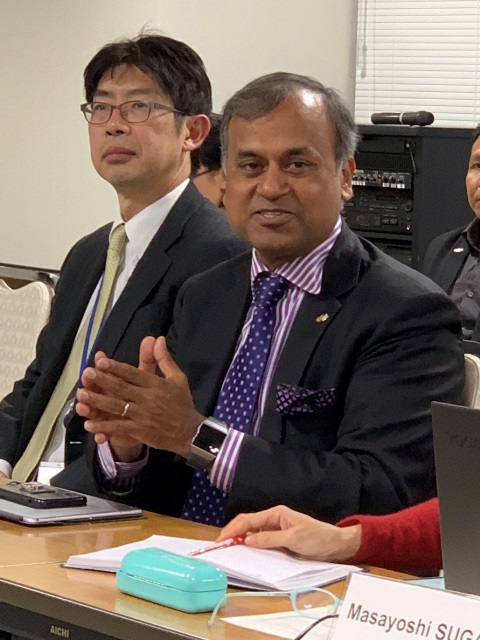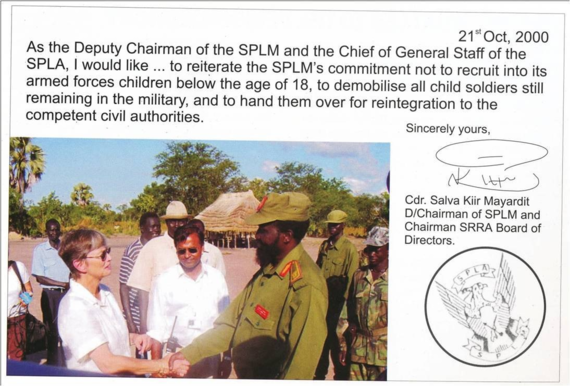The present conflict is merely the symptom of a more fundamental schism in South Sudanese society. Traditional tribal rivalries and competition for resources is at the heart of the problem.

“UN Resident Coordinator Siddharth Chatterjee with Mr. Masahiko Kiya,Deputy Assistant Minister and Deputy Director-General for African Affairs Bureauof the Ministry of Foreign Affairs of Japan at a meeting in Tokyo, Japan. 10 January 2019.
By Siddharth Chatterjee
It suddenly feels like Harold Ramis’s famous film, Ground Hog Day. I served with UNICEF in South Sudan from June 2000 to September 2001, bringing humanitarian and life-saving services to a war-torn, drought ridden and impoverished part of Africa which was aptly called ‘Operation Life-Line Sudan’.

“Commander Salva Kiir, Chief of the SPLA, meeting Ms Carol Bellamy, then UNICEF Executive Director, in Rumbek,South Sudan, Oct 21, 2000″. Watch the Video of the demobilization of child soldiers. (Photo Credit: UNICEF)
Then, two vicious conflicts were going down: on one hand the Sudanese government was fighting a secessionist movement in the South of the country, while on the other hand two factions of the secessionists in the south were also fighting for supremacy.
John Garang and his deputy Salva Kiir (now President of South Sudan) were heading the Sudan People’s Liberation Movement (SPLM), while the other movement Sudan People’s Defense Force (SPDF), was led by Riak Machar (the former Vice President of South Sudan).
Fast forward, and the current skirmishes in South Sudan, the world’s youngest nation can only present a powerful sense of déjà vu.
The reality is that the present conflict is merely the symptom of a more fundamental schism in South Sudanese society. Traditional tribal rivalries and competition for resources are at the heart of the problem.
The political fracas has led to violent clashes between the Dinka tribe, of which President Kiir is a member, and the Nuer tribe, which the former Vice President Machar belongs to.
For the international community, as well as any specific countries that may be looking to intervene to prevent a further escalation of the violence or to protect their own interests in the country, it is important that they realize that the situation will not de-escalate by simply putting more ‘boots on the ground’. The divisions between the Dinka and the Nuer go back decades and always been nuanced by a subculture of ethnic violence.
To prevent an internecine civil war from further escalating, it is essential that grassroots-level peace initiatives begin that focus less on the grievances each side carries and more on the potential for the two tribes to work together to build a new South Sudan.
For any lasting peace to be possible in South Sudan, it is essential that political consensus emerges from grassroots-level peace initiatives and infrastructures that take into account existing differences between various tribes as well as political factions.
South Sudan celebrated a new peace deal in October 2018 as fervent hopes of an end to a conflict that has killed hundreds of thousands of people were tempered by widespread skepticism that the fragile agreement will hold. This peace agreement gives the world another window of opportunity to broaden and deepen the peace process.
Apart from the Dinka and Nuer, it is important to include all the tribal groups such as the Murle, Bari, Azande and Shilluk. Inclusivity of the different ethnic groups must be built into the process so as to ensure the sustainability of peace in the state.
At the same time, the international community has to commit its weight and resources to preventing bloodshed of civilians at the hands of armed militias, both government-controlled and rebel-run. They have to ensure that the leadership of both sides get an unequivocal message that they must proceed with prudence and maturity in resolving their differences and not violence.
As UNESCO’s founding charter emphasizes, “Since wars begin in the minds of men, it is in the minds of men that the defenses of peace must be constructed.”
Therefore while high-level interventions are much needed at present to resolve this crisis, the work to reconcile the various groups at the grassroots-level must start in earnest so as to prevent history from repeating itself yet again.
Siddharth Chatterjee is the United Nations Resident Coordinator in Kenya. This is his twitter handle.




